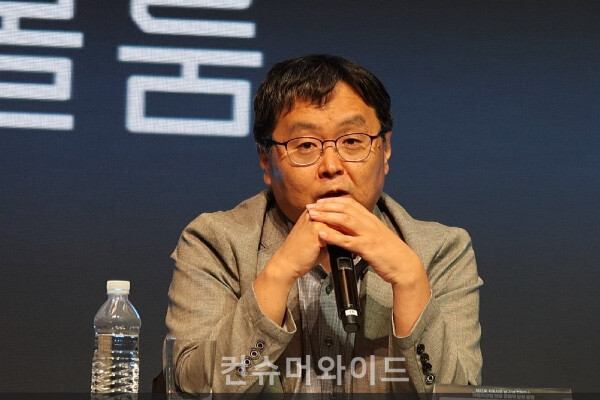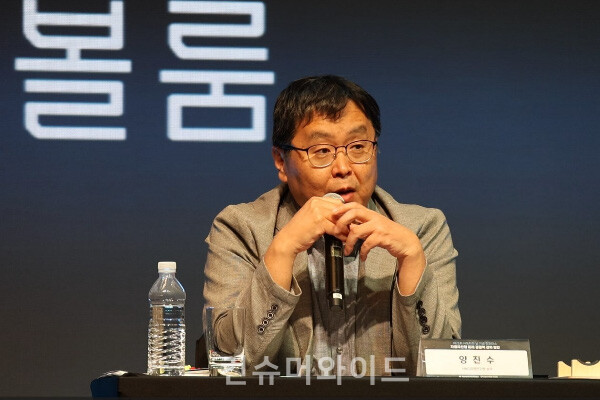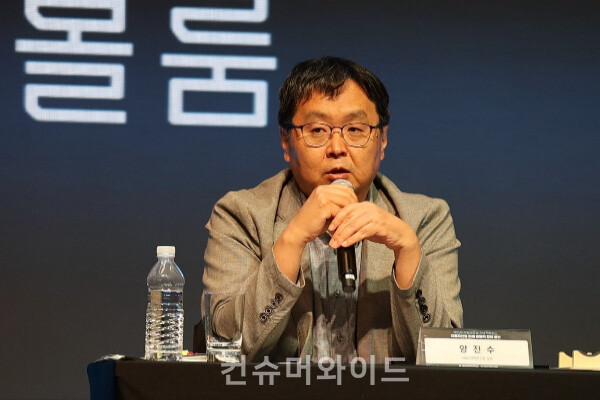Yang Jinsu, the director of HMG Strategy’s Research Team, speaks about "securing competitiveness differentiated from Chinese companies."

[Consumerwide - HueSoung Jun Reporter / Yohan Bok Reporter]Vehicle experts in Korea perceive that practical roadmaps and strategies are indispensable for the vitalization of the SDV industry, ultimately aiming to strengthen the future competitiveness of the Korean vehicle industry. During a panel discussion on the 21st Korea Automobile Day, Lee Hanggu, the director of the Institute of Automotive Convergence Technology; Yang Jinsu, the director of HMG Strategy’s Research Team; Lee Jaegwan, the director of the Korea Automotive Technology Institute; and Hong Sungsu, a professor at Seoul University, spoke about ways to improve the mobility industry in the future.
On that day, Yang Jinsu, the director, proposed supporting and nurturing innovation among the vehicle businesses and initiating corporations with external bodies as a way to secure competitiveness from Chinese companies.
Yang Jinsu, the director, said, "Due to a shift in paradigm involving the electrofication SDV enhancement, potential power change in the industry caused by the rapid growth of Chinese manufacturers, and consumption reduction in the US and EU EV markets caused by the impractical nature of EV systems, such as poor charging facilities with high expenses in purchase, some of the legacy OEMs, such as GM and Ford, are making their adjustments in EV manufacturing accordingly. However, I perceive that electrofication is inevitable in the long term, concerning the environmental aspect. Currently, the major OEMs are focusing on developing the BEV with a 2-30,000 USD price range, and in the event of success, there is a large possibility that the electrofication will be highlighted again in the major market. SDV, smartization, and electrofication are not easy areas to handle, as proved by the Volkswagen case regarding Cariad S/W development. However, I perceive that this trend will be speeding up as existing businesses compete with Chinese businesses that are already advancing in the industry, along with more ICT businesses jumping into the vehicle industry."

Yang Jinsu, the director, foresaw that the technology paradigm shift, which involves electrofication and SDV, has an impact on the vehicle industry. He said, "In 10 years time, there seems to be a large change taken in the vehicle industry point of view in Korea, and this brings necessity for corporations between government and private sectors. Earlier, the improvement in competitivity of small vehicle parts businesses, nurturing S/W experts, and constructing the environmental mobility ecology, which are proposed by the Ministry of Industry, reflected the industrial situation well.
Yang Jinsu, the director, predicted the possibility of a power change in the vehicle industry, perhaps towards Chinese manufacturers. He said, "China has been investing consistently for over a decade, led by the government, in future vehicle development, including the BEV, which has resulted in the remarkable progress of Chinese manufacturers today. Particularly, the competitiveness of Chinese manufacturers is high in terms of cost and speed. BYD has released BEVs in the same price range as combustion engine vehicles with the same level of capacity, and their ICT (information, communication, and technology) is beyond other businesses in the same field of industry. The industrial commons is one of the fundamental grounds that bring competitiveness. Volkswagen is partnering with Xiaopeng Motors Technology in order to take advantage of the Chinese companies, whereas Stellantis is partnering with Leaf Motor to develop the BEV with a low price range."

Consequently, Yang, the director, proposed differentiating competitiveness as a future direction for the vehicle industry in Korea. He said, "It might not be easy to compete with the Chinese manufacturers that are rapidly growing in the global vehicle industry. However, we've got to jump into competition by taking the first step, which is reducing the price and speed gap with Chinese manufacturers. The large vehicle manufacturers have got to improve their competitiveness through internal innovation while initiating corporate work, and the government needs to support and nurture the industrial commons in Korea to give the industry the foundational grounding to grow. In the mid-long term plan, we've got to grow in competitiveness based on some of the advanced technologies of Korea, such as AI, batteries, and semi-conductors, which are demanded by the future vehicle industry. On top of that, Korea has a market environment where consumers are relatively quick to accept new technology, which can speed up mobility innovation. This might help Korean businesses secure competition from Chinese businesses."

